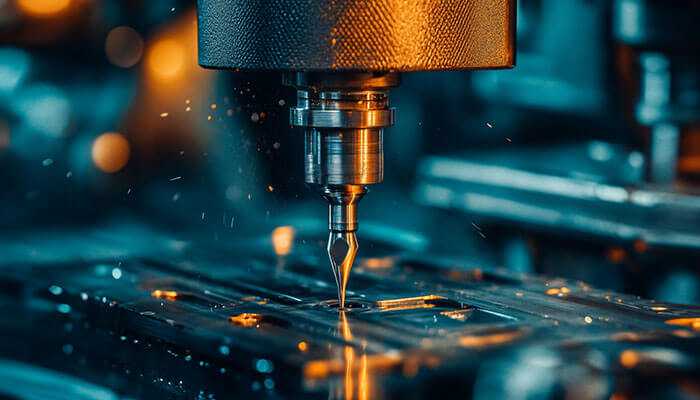In a time where industries demand precision, speed, and efficiency, CNC drilling stands as a technological marvel, revolutionizing manufacturing processes across industries. This advanced technique, powered by computer numerical control, offers unparalleled accuracy and flexibility in creating intricate designs and complex components.
This blog post will discuss the intricacies of CNC drilling, exploring its core principles, applications, and transformative impact on modern manufacturing.
What Is CNC Drilling?
Computer Numerical Control (CNC) drilling is an advanced manufacturing process that uses computerized systems to control drilling machines. These machines are programmed to create consistent and precise holes in various materials, including metals, plastics, wood, and composites.
CNC machines automate the drilling process, ensuring accuracy, repeatability, and efficiency, making them indispensable in modern manufacturing. Trusted providers like Cutwrights leverage CNC drilling technology to deliver high-quality results tailored to a variety of materials and applications.
Unlike traditional drilling methods, CNC drilling relies on pre-programmed software and G-code to manage critical parameters such as depth, diameter, and hole placement. This automation eliminates manual errors, enabling the production of complex designs with tight tolerances. CNC drilling machines often feature multi-axis capabilities, which allow them to drill at various angles and create intricate cylindrical holes that would be challenging or impossible to achieve manually.
Unlocking the Potential of CNC Drilling
CNC drilling has become a transformative force in modern manufacturing, reshaping how industries approach production. CNC drilling has revolutionized traditional processes by introducing automation, precision, and scalability. Here’s how:
1. Unmatched Precision and Accuracy with CNC Drilling
CNC drilling offers unparalleled precision and consistency, which is vital in industries requiring exact tolerances. By relying on pre-programmed software and G-code, CNC machines eliminate the variability associated with human error, ensuring that every drilled hole meets strict specifications.
This level of accuracy is especially critical in fields like aerospace and medical device manufacturing, where even microscopic deviations can result in product failures or safety hazards. With CNC drilling, manufacturers can confidently produce complex, high-precision components that meet stringent industry standards, even in large-scale production runs.
2. Enhanced Efficiency and Productivity
The automation of CNC drilling significantly boosts production efficiency and throughput. Unlike manual methods that require frequent pauses for tool adjustments or workpiece repositioning, a CNC machine with multi-axis capabilities can perform complex operations in a single setup.
This reduces cycle times and allows machines to operate continuously, even during unmanned shifts, dramatically increasing output. By streamlining workflows and reducing bottlenecks, drilling ensures manufacturers can meet high-volume production demands without sacrificing quality or precision.
3. Cost-Effectiveness and Waste Reduction with CNC Drilling
While CNC drilling systems require a substantial initial investment, their long-term cost-saving benefits are immense. Automation reduces the need for a large workforce, lowering labor costs. Additionally, the precision of drilling minimizes material waste by ensuring accurate cuts and preventing errors.
This results in fewer defective parts and reduces the expense of rework or scrap materials. Over time, the efficiency and reliability of drilling translate into significant financial savings, making it an economically
4. Flexibility and Adaptability
CNC drilling machines are designed to accommodate a wide variety of materials and applications, making them highly versatile tools. They can process metals, plastics, wood, and composites with equal precision, catering to diverse industry needs.
The ability to quickly reprogram a CNC machine for different projects allows manufacturers to adapt to changing production requirements or customer demands. Whether creating prototypes for product development or switching to high-volume production runs, CNC machining process provides the flexibility necessary to thrive in dynamic markets.
5. Improved Workplace Safety
By automating the drilling process, CNC machines greatly enhance workplace safety. Operators are no longer required to work near a cutting tool, reducing the risk of injuries from sharp edges, high-speed rotation, or material handling.
Advanced safety features, such as emergency stop mechanisms and protective enclosures, further safeguard workers by preventing accidents during operation. The improved safety standards protect employees and contribute to a more compliant and efficient workplace, reducing downtime and liability costs.
6. Seamless Integration with Manufacturing Systems
CNC drilling machines are highly compatible with other systems, such as CNC milling machine, turning, and routing machines, enabling seamless integration into broader manufacturing workflows. This interconnectedness allows multiple operations to be completed in a single setup, reducing the time and effort required for transitioning between tasks.
Manufacturers can streamline the CNC drilling process, reduce lead times, and improve overall efficiency by integrating CNC drilling into a cohesive production line. This capability is particularly beneficial in industries where speed and precision are essential for competitiveness.
7. Superior Quality and Reliability
CNC drilling ensures consistent quality and reliability across every production run. The precise control over parameters, such as depth, feed rate, and speed, eliminates variations between parts, guaranteeing uniformity in the final product.
This reliability is crucial for construction and electronics manufacturing, where high-quality components are essential for system integrity and performance. By delivering dependable results, it enhances customer satisfaction and reinforces manufacturers’ reputations for delivering superior products.
From reducing costs to ensuring workplace safety and maintaining exceptional quality, a machine empowers manufacturers to meet the challenges of today’s competitive markets while driving innovation and growth.
Conclusion
CNC drilling has emerged as a cornerstone of modern manufacturing, offering unparalleled precision, efficiency, and flexibility. By automating the drilling process, CNC machines significantly reduce human error, improve product quality, and streamline production cycles. As technology advances, CNC drilling is poised to play an even more significant role in shaping the future of the manufacturing industry.




